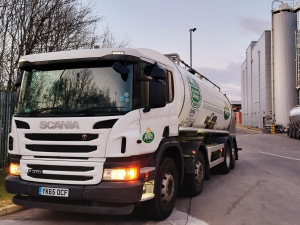Global Dairy Trade Recovery Puts $9.50 Milk Price Within Reach
A solid recovery of global dairy prices this year makes a $9.50/kgMS milk price almost a shoo-in for this season.
 Milk price paid to Arla’s farmer suppliers will be linked to environmental sustainability from next year.
Milk price paid to Arla’s farmer suppliers will be linked to environmental sustainability from next year.
European dairy co-operative Arla says, from next year, the milk price paid to farmer suppliers will be linked to environmental sustainability.
Two years after implementing a comprehensive 'Climate Check' on 8,000 farms across seven European countries, Arla farmers are taking another significant step to be at the forefront of environmentally sustainable dairy, the co-op says.
Arla is introducing a point-based Sustainability Incentive model, building on data from the Climate Check, to reward current and future sustainability activities on farm.
Arla directors are putting 3 eurocent/kg of milk on the table annually to fund and motivate environmental improvements on 19 levers. The full incentive package includes the one eurocent that farmers will receive for submitting their Climate Check data. In the first full year, at least 270 million euro is expected to be distributed through the monthly milk price based on what the farmers are doing on 19 levers in the model.
Arla chairman Jan Toft Nørgaard says the Sustainability Incentive model is a historical milestone in Arla's transition to more sustainable dairy.
"We are introducing an advanced and ambitious sustainability incentive, which is a fundamental change to our milk price model.
"Going forward, the milk price Arla farmers will receive for their milk will not only depend on fat, protein and quality, it will also depend on their activities on sustainability.
"The support from our members, even in a time of great uncertainty, is a testament to our commitment to be at the forefront of progressive dairy farming and set the standard for how to push our whole sector forward."
The three eurocent comes on top of the one eurocent that farmers receive for submitting their Climate Check data, which is a pre-condition and the foundation for calculating the individual farmer's incentive.
Based on Arla's current owner milk volume, the four eurocents per kilo of milk amounts to an annual 500 million euro that Arla's board of directors are willing to take from Arla's milk price and re-distribute to that farmers based on their individual points in the Sustainability Incentive model.
With the current milk price, it corresponds to about 7% of the milk price, the co-op says.
Arla chief executive Peder Tuborgh believes the Sustainability Incentive will be an effective tool for driving further improvements.
“Arla has some of the most climate-efficient farmers in the world, however, they also recognise that they need to accelerate their efforts to be at the forefront of environmentally sustainable dairy.
“With this historical step, we will stand stronger in the market and send a clear message to our customers and consumers that the necessary change comes at a price for our owners and that a fair amount of the money you pay for Arla products is directed to the farmers who take the most action.”
The model is a point-based system, in which the farmers can collect points based on their activities on the model’s 19 different levers like feed, protein and fertiliser efficiency, manure delivery to biogas, biodiversity, carbon farming and use of renewable electricity and deforestation free soy.
Eighty points will be available from the start in 2023 and a further 20 points for new levers are expected to be built into the model within a few years, leading to a total of 100 points. For each point that the farmers are able to achieve, they will receive 0.03 eurocent per kilo of milk. Activities with bigger improvement potential for climate and nature will lead to the most points – and therefore also the biggest financial incentive.
Voting has started for the renewal of DairyNZ's milksolids levy.
The most successful catchment groups in NZ are those that have 'a source to sea' approach.
Associate Agriculture Minister and Manawatu dairy farmer Andrew Hoggard says the free trade agreement (FTA) negotiated with India is not a bad deal and his party, Act, will support it when it goes before Parliament.
Newly released data from Environment Canterbury (ECan) Farm Environment Plan (FEP) audits are showing a dramatic lift in environmental performance across the region.
A solid recovery of global dairy prices this year makes a $9.50/kgMS milk price almost a shoo-in for this season.
As New Zealand marks the United Nations’ International Year of the Woman Farmer 2026 (IYWF 2026), industry leaders are challenging the misconception that women only support farming.
OPINION: Fonterra may be on the verge of selling its consumer business in New Zealand, but the co-operative is not…
OPINION: What does the birth rate in China have to do with stock trading? Just ask a2 Milk Company.